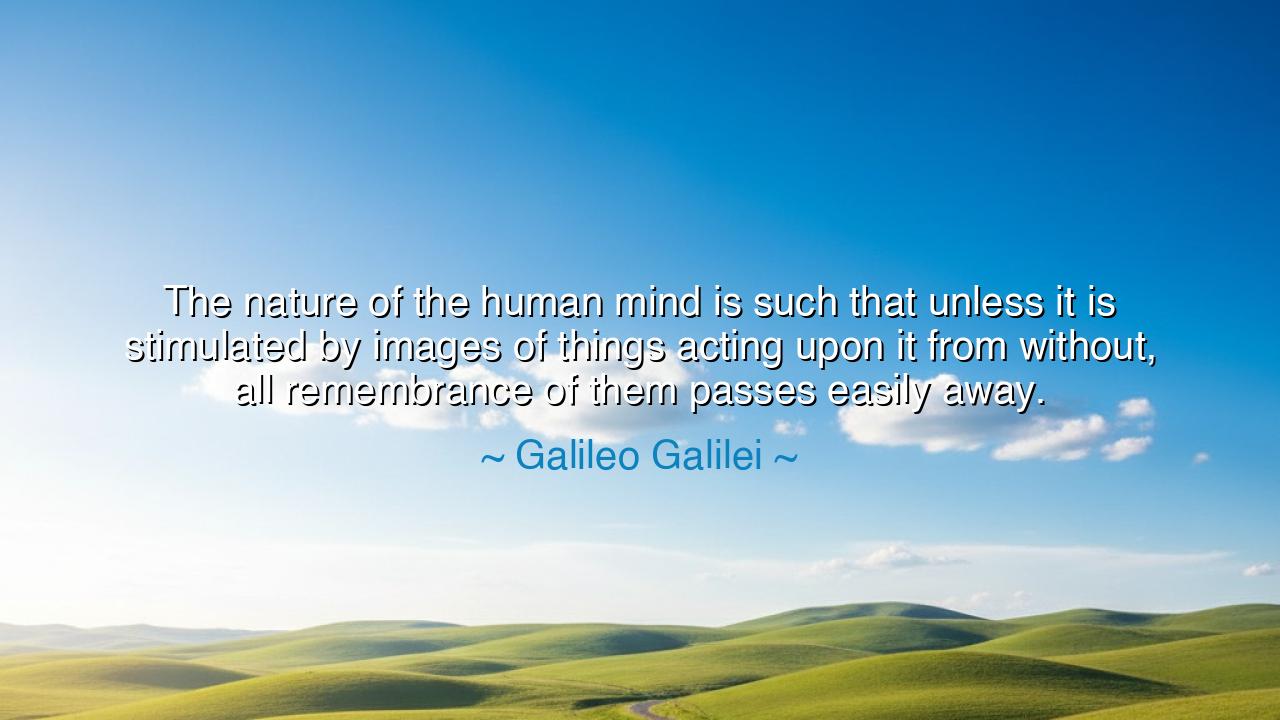
The nature of the human mind is such that unless it is
The nature of the human mind is such that unless it is stimulated by images of things acting upon it from without, all remembrance of them passes easily away.






Hear now the words of Galileo Galilei, father of modern science, who declared: “The nature of the human mind is such that unless it is stimulated by images of things acting upon it from without, all remembrance of them passes easily away.” In this truth lies a deep mystery of our condition: that the mind, though vast and capable of greatness, is not a vessel that holds memory without effort. It is more like a fire—if not fed by fresh wood, it dims and dies. Thus, the sage warns us that memory must be awakened by experience, sight, and image, lest all knowledge fade like mist at dawn.
The human mind is not stone, but water. Words alone, spoken once, flow quickly from it. But when those words are joined to images, to living symbols that strike the senses, they carve deep channels, and memory remains. So the ancients built their myths not in dry teachings, but in living stories filled with gods, monsters, and heroes. They knew well that man recalls what he has seen in vision more than what he has heard in abstraction. And Galileo, lover of truth, understood the same: that the scholar and the teacher must give the mind food for the eyes and the imagination, else all wisdom is forgotten.
Consider the example of Alexander the Great. His tutor was none other than Aristotle, who did not merely lecture his pupil but filled his world with images: the maps of lands unknown, the specimens of nature collected from distant regions, the grand stories of Homer read aloud like living fire. Thus, when Alexander later conquered Asia, he carried not only weapons but also a vision. Without these vivid impressions, even the mind of a future conqueror might have grown dull, and the seed of greatness might have withered unremembered.
Galileo himself lived by this truth. When he gazed upon the heavens through his telescope, he did not write merely that “there are moons around Jupiter.” No, he drew images of them, carefully marking their changing positions night by night. These drawings became more powerful than argument, for they stirred the minds of others as no words alone could. His enemies could dispute his logic, but they could not erase the images that engraved themselves upon the soul. This is the wisdom he passes down: the eye, when touched, awakens the memory more surely than the ear alone.
There is also a warning in his words. If we do not nourish the mind with living impressions, with real encounters, with images that stir, then all our resolutions, our lessons, our hard-won truths will fade. Many swear to change, to live better, to seek wisdom—yet without a daily spark, these promises pass away. The remembrance of them is like writing upon sand, easily scattered by the wind. To keep the mind alive, one must continually refresh it with visions, symbols, reminders, and practices that keep truth before the eyes.
Therefore, O children of learning, seek always to stimulate your minds with what endures. If you would learn, do not only hear, but see. If you would remember, bind knowledge to images, to rituals, to acts that etch themselves upon the senses. Do not let your mind drift into forgetfulness, for neglect will erase even the noblest of lessons. Build for yourself memorials—books well kept, images revisited, practices repeated—so that what matters most does not slip away.
The lesson is clear: memory is strengthened by vision. When you wish to hold fast to truth, give it shape, give it form, give it presence in your daily life. Write it upon paper, carve it into symbol, or place it where your eyes must often fall. And in teaching others, do not only speak, but paint with words, show with images, and let imagination awaken what mere sound cannot hold.
Practical counsel I leave you: keep a journal of images as well as words; surround your dwelling with symbols of what you wish never to forget; practice learning with all senses awake. For when knowledge is joined to image, it becomes living flame, and such flame, once kindled, does not easily die. In this way, you honor the wisdom of Galileo and ensure that what is worthy in your life will not pass away like a shadow at sunset.






AAdministratorAdministrator
Welcome, honored guests. Please leave a comment, we will respond soon